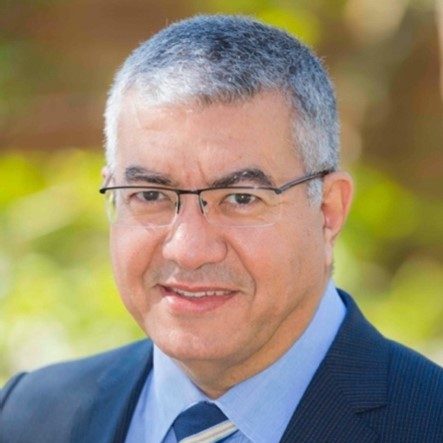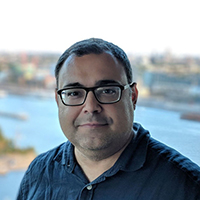Keynotes
IoTility: Unleashing the Utility of Internet of Things through Microservices Architectural Extensions
Abdelsalam (Sumi) Helal – University of Florida, USA

Bio: Sumi Helal is a Professor in the Computer & Information Science and Engineering Department at the University of Florida, USA, and Director of its Mobile and Pervasive Computing Laboratory. He co-founded and directed the Gator Tech Smart House, a real-world deployment project that aimed at identifying key barriers and opportunities to make the Smart Home concept a common place (creating the “Smart Home in a Box” concept). His active areas of research focus on architectural and programmability aspects of the Internet of Things (IoT), service-oriented IoT architectures, IoT edge intelligence, and pervasive/ubiquitous systems and their human-centric applications, especially in the Digital Health area. Helal is also a technologist at heart who founded several successful ventures in the areas of IoT and Digital Health. His patents that came out of his research were licensed by the top multinational tech industry including Google, Apple, Samsung, Bosch, T-Mobile, Verizon, among others. Helal is a Fellow of the ACM, IEEE, AAAS, AAIA, IET, and a member of Academia Europaea.
Abstract: While we all share the excitements of great IoT visions and impressive IoT scenarios and possibilities, we do not yet have a clear pathway to realizing this vision systematically and on a broad and large scale. In fact, it can be argued that the focus on vision and abstracting away many details, including about “things” themselves were intentional to productively bolster our imagination; but this approach has now run its course. Ignoring the details and staying abstract will be counterproductive at this stage. We view the success of the IoT to largely depend on how its main ingredient, the thing, is architected, prepared, and tooled to deliver on the high expectations of the blue-sky visions. In other words, we see no short cuts to having to walk before we run. Service-oriented device architecture (SODA) was a successful beginning in our research journey, where devices were made capable of generating and publishing their services to an edge node or as endpoints in the cloud. IoT programmability through traditional service composition was a tangible gain at the time, which was utilized in the Gator Tech Smart House – an assistive environment for graceful aging project.
However, much remains to be needed to achieve an explicit thing architecture capable of delivering on the highly anticipated visions. For example, we still do not understand how to expressly program an IoT as we have programmed previous generations and forms of the computer. This is obviously an essential requirement for any meaningful proliferation and adoption of the IoT technology. Except for a few ideas and tools that exist today, the programmability view of IoT lacks clarity and, in fact, there are no clear boundaries that separate IoT as a distributed computer from IoT as applications. In this talk, after a brief introduction to SODA, I will present requisite requirements that we must satisfy to bolster the programmability and utility of IoT as an emerging industry and as an applications ecosystem.
I will present our current/ongoing work on critical extensions to the microservices architecture, collectively referred to as IoTility. First, I will focus on self- and peer-conscious microservices, which enable the IoT to autonomically learn how its things may relate to one another and what opportunities can be collectively formed, even tentatively, to the IoT users and their smart spaces. Second, I will show how giving microservices consciousness promises to make them a first-class citizen and a capable actor in the development and operation lifecycles of IoT applications and systems. This “collaborative microservice programmability” extension brings disrupting changes to the well- and long-established roles of software development, making the IoT thing (and its vendor who created it in the first place), as well as the lay user, primary developers of the IoT applications. Third, I will present IoTranx – a “safety” framework that brings transactional extensions to microservices for the development of safe cyber-physical systems and applications using IoT. I will show how such “safety-oriented programming model” prevents or avoids harms, errors, and malfunctions in presence of several cyber-physical uncertainties or un-orchestrated multiple IoT deployments. Fourth, I will revisit programmability from a different angle, and that is the inequitable utility. Despite numerous advances in IoT, it remains the case that a lay user must be of the DIY type or a computer geek to combine and program a collection of IoT devices into a smart space. I will present some ideas to democratize the IoT technology and to overcome its inequitable utility. I will present these democratization ideas within an example in the personal health domain.
Service Governance in a Transforming World – Challenges Ahead
Pablo Fernandez – University of Sevilla, Spain

Bio: Pablo Fernandez is an Associate Professor of Software Engineering at the University of Sevilla. Throughout his career, he has participated in more than 30 research and transfer projects with extensive collaboration with private companies and public administrations. All this activity has been developed within the Applied Software Engineering Group (ISA Group), contributing to its creation in 2007. Currently, he leads the Service Line, which focuses on evolving service science and engineering in the context of service governance over the cloud continuum. He regularly collaborates with different groups internationally, with more than 60 publications in international journals and conferences; he has been an invited scholar at the University of California, Berkeley, the Technical University of Vienna (TWU), and Newcastle University. In recent years, he was appointed as Director for research resources at the Vice-Chancellor’s Office for Research of the University of Sevilla, coordinating the governance, design and evolution of IT Systems to optimize the management and procedures that support the research activity for the community of 4000+ researchers in the University. Before his academic career, he played the roles of Software Architect and Project Manager in different firms, acting as IT Infrastructure supervisor during the Athens 2004 Olympics.
Abstract: Service-oriented computing (SOC) has gained traction across various domains, offering a fertile ground for the emergence of new generations of service chains. These service chains are growing and evolving continuously, unlocking unparalleled integration and customization opportunities. This shift towards SOC has introduced an ecosystem of seamless interoperability; however, it doesn’t come without governance challenges. As the intricacy of the service chains grows, issues related to agility, privacy, and capacity management become evident. In this talk, we will reflect on different challenges that should be faced to harness these opportunities.
Logic, Automata, and Games in Service Composition
Giuseppe De Giacomo – University of Oxford, UK

Bio: Giuseppe De Giacomo is currently a Professor of Computer Science at the Department of Computer Science of the University of Oxford. For several years he has been a professor at the Department of Computer, Control, and Management Engineering of the University of Roma “La Sapienza”. His research activity has concerned theoretical, methodological, and practical aspects in different areas of AI and CS, most prominently Knowledge Representation, Reasoning about Actions, Generalized Planning, Autonomous Agents, Service Composition, Business Process Modeling, and Data Management and Integration. He is AAAI Fellow, ACM Fellow, and EurAI Fellow. He has got an ERC Advanced Grant for the project WhiteMech: White-box Self Programming Mechanisms (2019-2024). He is a co-author of the paper “Automatic Composition of E-services That Export Their Behavior” ICSOC 2003, awarded as the most influential paper of the decade at ICSOC 2013.
Abstract: Temporal logics on finite traces (LTLf, LDLf, PPLTL, etc.) are increasingly attracting the interest of the scientific community. These logics are variants of temporal logics used for specifying dynamic properties in Formal Methods, but focussing on finite though unbounded traces. They are becoming popular in several areas, including AI planning for expressing temporally extended goals, reactive synthesis for automatically synthesizing interactive programs, reinforcement learning for expressing non-Markovian rewards and dynamics, and Business Process Modeling for declaratively specifying processes. These logics can express general safety and guarantee (reachability) properties, though they cannot talk about the behaviors at the infinitum as more traditional temporal logics on infinite traces. The key characteristic of these logics is that they can be reduced to equivalent regular automata, and in turn, automata, once determinized, into two-player games on graphs. This gives them unprecedented computational effectiveness and scalability. In this talk, we will look at these logics, their corresponding automata, and resulting games, and show their relevance in service composition. In particular, we show how they can be used for automatically synthesizing orchestrators for advanced forms of goal-oriented synthesis.

